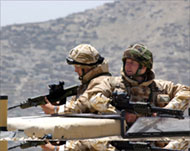Karzai: Stop terrorists’ supply sources
The Afghan president has criticised the US-led multinational force’s anti-terror campaign, saying the deaths of hundreds of Afghans, including Taliban fighters, was unacceptable and that his government needs more help.

Hamid Karzai, who has previously scorned large-scale anti-insurgency campaigns, on Thursday rejected the continued spilling of Afghan blood in military operations.
“It is not acceptable for us that in all this fighting, Afghans are dying. In the last three to four weeks, 500 to 600 Afghans were killed. [Even] if they are Taliban, they are sons of this land,” a clearly frustrated Karzai said in Kabul.
He said the current focus on hunting Taliban fighters didn’t address terrorism’s root causes. “We must engage strategically in disarming terrorism by stopping their sources of supply of money, training, equipment and motivation,” he said.
He also said the war on terror needs to be broadened outside of Afghan borders. “We are concerned about the increase of attacks in our country,” he said.
“Some of the reasons are the internal weakness of administration in our country, but most of the factors are foreign factors, terrorism and organised attacks.”
He did not elaborate on which “foreign factors” were involved, but many Afghan officials have accused neighbouring Pakistan of doing too little to catch Taliban fighters planning attacks from Pakistan. Pakistan denies the claims.
Security assistance
Karzai said Afghanistan has received considerable help in reconstruction fields, but has not been given the assistance needed to strengthen its police force, army and government administration.
“This is one of the reasons for the unhappiness between us and the international community,” he said. “We did not get the assistance and co-operation that is necessary for a strategy for counterterrorism.”
 |
|
Multinational forces are meeting |
A February donors conference in London pledged $10.5 billion in new aid for Afghanistan – most for improving security. About 37,000 new soldiers and more than 50,000 police have been trained but many more are needed.
Also on Thursday, the Afghan president defended guidelines issued to news groups about reporting on the Taliban insurgency, saying some media were “legitimising terrorism” in their articles.
He said he would guarantee media freedom but his government was concerned about how some of the media were reporting on the insurgency by the Taliban movement.
Media guidelines
Karzai said: “Part of the media especially the electronic media are … almost legitimising some acts of terrorism. That’s what we’re concerned about. That’s what we are trying to correct.”
The document containing the guidelines was sent to Afghan editors on Monday, prompting an outcry from rights groups concerned about press freedom as Afghanistan tries to establish itself as a democracy.
It says “terrorist commanders” should not be interviewed or the Nato and US-led forces criticised.
|
“These directives are an insult to the hard work and personal sacrifice of Afghan journalists who try to get the truth out to the public” Sami Zarifi, |
Stories of terror activities should not lead news bulletins and “enemy” statements which portray the government as un-Islamic should not be covered or the security forces portrayed as weak.
Some television stations have broadcast interviews with alleged Taliban officials who speak against Karzai’s government and the thousands of international soldiers based in Afghanistan to hunt down Taliban and al-Qaeda fighters.
Other media prominently carry Taliban claims about attacks that turn out to be false or exaggerated.
The hand-delivered 24-point list was anonymous but understood to have been issued by the intelligence service which had summoned editors to a meeting on the topic last week.
‘An insult’
New York-based Human Rights Watch criticised the notice, saying it should be immediately revoked by the government.
Sam Zarifi, the group’s Asia research director, said: “The intelligence services restrictions are a blatant intrusion on the freedom of Afghanistan’s fledgling media.
“These directives are an insult to the hard work and personal sacrifice of Afghan journalists who try to get the truth out to the public.”
The Afghanistan Independent Human Rights Commission said it was concerned but added that it had reservations about some of the media’s reporting.